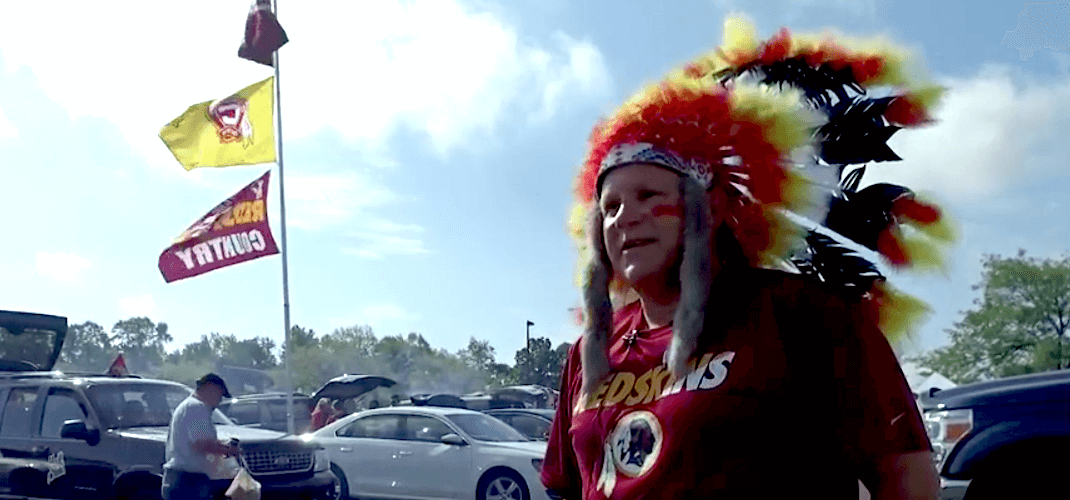Making Sense of the Backlash Against Cultural Appropriation

Scene from More than a Word, a film about Native American sports mascots
Every Halloween, we see stories that remind us that one person’s idea of an innocent costume is another person’s idea of a cultural insult. That’s why the next few weeks are a good time to help your students make sense of the growing backlash against cultural appropriation and stereotyping.
As the mounting outrage over Canadian Prime Minister Justin Trudeau’s longtime penchant for blackface has reminded us, this is an issue that isn’t going away.
Below you’ll find a number of MEF films that examine the destructive personal, social, and political impact of racial and ethnic stereotyping. We urge you to screen these titles with your students over the coming weeks.
MORE THAN A WORD
More Than a Word offers a fascinating look inside the growing movement to change the name of the Washington R*dskins football team. Directed by brothers John and Kenn Little, who are members of the Standing Rock Sioux tribe, the film traces how the word “r*dskin” evolved from being a term of racist derision and slander to being embraced as the name of one of the NFL’s most beloved franchises. It also draws on the voices of Native American activists and scholars to place this controversy within the wider context of Native American history and racial stereotyping more generally. More Than a Word is an ideal classroom resource for clarifying what’s truly at stake in contemporary debates about cultural appropriation and Native American-themed mascots.
CONSTRUCTING THE TERRORIST THREAT
Deepa Kumar, one of the nation’s foremost scholars on Islamophobia, looks at how Muslims have become the predominant face of terror in U.S. news and entertainment media — even though terror attacks by white extremists have far outnumbered attacks by Muslim Americans since 9/11. Arguing that racialized threats have long been used to induce moral panics and advance anti-democratic policies, Kumar explores how ruling elites have been raising the specter of Arab and Islamic terror since the 1970s to justify militarism, war, and curbs on civil liberties. From the Iran-Hostage Crisis in 1979 to the “war on terror” after 9/11 to the rise of ISIS today, she argues that Americans have been taught to fear Muslims out of all proportion to reality, presenting a wealth of eye-opening data about the actual threat level posed by Muslim terrorists in the United States. Constructing the Terrorist Threat offers a clear-headed assessment of terrorism that couldn’t be more timely and urgent given the politics of fear that now dominate our political landscape.
REEL BAD ARABS
This groundbreaking documentary dissects a slanderous aspect of cinematic history that has run virtually unchallenged from the earliest days of silent film to today’s biggest Hollywood blockbusters. Featuring acclaimed author Dr. Jack Shaheen, the film explores a long line of degrading images of Arabs–from Bedouin bandits and submissive maidens to sinister sheikhs and gun-wielding “terrorists”–along the way offering devastating insights into the origin of these stereotypic images, their development at key points in U.S. history, and why they matter so much today. Shaheen shows how the persistence of these images over time has served to naturalize prejudicial attitudes toward Arabs and Arab culture, in the process reinforcing a narrow view of individual Arabs and the effects of specific US domestic and international policies on their lives. By inspiring critical thinking about the social, political, and basic human consequences of leaving these Hollywood caricatures unexamined, the film challenges viewers to recognize the urgent need for counter-narratives that do justice to the diversity and humanity of Arab people and the reality and richness of Arab history and culture.
LATINOS BEYOND REEL
Latinos are the fastest-growing segment of the U.S. population, and among the most diverse — accounting for one-sixth of all Americans and tracing their origins to more than 20 countries. They are also a rising force in American politics. Yet across the American media landscape, from the broadcast airwaves to cable television and Hollywood film, the reality and richness of the Latino experience are virtually nowhere to be found. In Latinos Beyond Reel, filmmakers Miguel Picker and Chyng Sun examine how US news and entertainment media portray — and do not portray — Latinos. Drawing on the insights of Latino scholars, journalists, community leaders, actors, directors, and producers, they uncover a pattern of gross misrepresentation and gross under-representation — a world in which Latinos tend to appear, if at all, as gangsters and Mexican bandits, harlots and prostitutes, drug dealers and welfare-leeching illegals. The film challenges viewers to think critically about the wide-ranging effects of these media stereotypes, and to envision alternative representations and models of production more capable of capturing the humanity and diversity of real Latinos. Features commentary from Charles Berg, Otto Santa Ana, Angharad Valdivia, Federico Subervi, Mari Castaneda, Chon Noriega, Isabel Molina, Alex Nogales, Juan Gonzalez, Moctesuma Esparza, Josefina Lopez, Alex Rivera, Luis Ramos, Lisa Vidal, and others.

